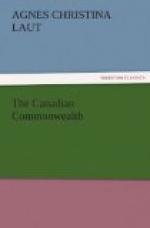Deep beneath all the jingoism these were the economic factors that rejected reciprocity. It is all a curious illustration of the difference between practical and theoretical politics. Theoretically both parties have been free traders in Canada. Practically free trade had thrown them both down. Theoretically Canada rejects reciprocity. Practically trade across the boundary has increased one hundred per cent. since she rejected reciprocity. Theoretically Canada was protecting her three transcontinental systems when she rejected reciprocity. Practically the growth of lines with running rights across the boundary has increased from sixteen to sixty-four in ten years.
When American industries have become rooted in Canadian soil beyond possibility of transplanting, no doubt the fear will be removed; and at the present rate of the increase of trade between the two countries the tariff wall must become an anachronism, if it be not worn down by sheer force of trade attrition.
Comical incidents are related of the Canadian fear in individual cases. There was a Scotch school trustee in Calgary. He had voted Whig-Liberal-dyed-in-the-wool free trade for forty years—from the traditions of reciprocity under Alexander Mackenzie. A Canadian flag was flying above the fine new Calgary school. The Scotchman was going to the polls by street-car. An excursion of American home seekers had just come in, and one of the variety to essay placing an American flag on the pyramids had taken a glass too much. He began haranguing the street-car. “So that’s the old Can-a-day flag,” said he. “You jus’ wait till to-morrow and, boys, you’ll see another flag above that thar school ’ouse!”
Now a Scotchman is vera’ serious. The Scotch trustee gave one glowering look at that drunken prophet; and he rang the street-car bell; and he went at the patter of a dead run to the polling place; and for the first time in his life he voted, not Whig, not free trade, not reciprocity and Laurier, but Tory and high tariff. [1]
It should be added here that the tariff reductions on food under President Wilson have justified Canada’s rejection of reciprocity. Canadian farm products have gained freer access to the American market without a quid pro quo.
[1] Opponents of reciprocity in the United States made skilful use of Canadian touchiness on such matters, and not all such expressions as that quoted above were spontaneous.—THE EDITOR.
CHAPTER VI
THE COMING OF THE ENGLISH
For a hundred years England’s colonies have been distinctively dependencies—self-governing dependencies, if you will, in the case of Canada and Australia—but distinctively dependent on the Mother Country for protection from attack by land and sea. Has the day come when these colonies, are to be, not lesser, but greater nations—offshoots of the parent stock but transcending in power and wealth the parent stock—a United Kingdom of the Outer Meres, becoming to America and Australasia what Great Britain has been to Europe?




